Special Report
The Happiest Countries in the World

Published:
Last Updated:

Subjective well-being, or personal happiness, can depend heavily on country of residence. Western European and North American countries tend to have the happiest populations, while residents of countries in sub-Saharan Africa and the Middle East are most likely to be unhappy.
Hard to quantify factors such as personality and social status can affect people’s assessment of their own well-being. As a result, asking individuals to rate their overall happiness on a scale of 0-10 for purposes of comparison would likely yield unreliable results. However, when such a survey is conducted over broad populations over the course of several years, clear patterns emerge.
Using years of data from the Gallup World Poll, which asked residents of 156 countries to rank their happiness, the United Nations’ Sustainable Development Solutions Network compiled the World Happiness Report 2018, ranking countries by happiness levels. The world’s happiest countries tend to share several factors related to the economy, social connections, and health outcomes.
24/7 Wall St. reviewed the World Happiness Report 2018 to identify the happiest countries in the world.
Click here to see the happiest countries in the world.
Click here to see our detailed findings and methodology.

25. Chile
> Happiness score: 6.5
> GDP per capita: $22,704
> Pop. satisfied with their personal freedom: 73.7%
> Pop. with close friends or family: 84.9%
> Healthy life expectancy at birth: 69.4 years
Chile is one of three countries in the Latin America and Caribbean region to rank among the happiest countries in the world. On a scale of 0-10, residents have an average well-being rating of 6.5, higher than in all but 24 other countries. Health is closely tied to happiness and Chileans can expect to live an average of 69.4 years in good health, a higher healthy life expectancy than in the majority of countries worldwide and the second highest of any country in the region. Positive health outcomes are closely correlated with wealth, and Chile is a relatively affluent country. The country’s GDP per capita of $22,704 is greater than that of most countries, and also the second highest in the region.
The country’s overall happiness would likely improve if corruption were reduced and trust in institutions restored. Nearly 84% of the population agrees that there is widespread corruption in government and business affairs, a larger share than in most countries and the second highest share among the happiest countries.
[in-text-ad]

24. Mexico
> Happiness score: 6.5
> GDP per capita: $16,838
> Pop. satisfied with their personal freedom: 77.7%
> Pop. with close friends or family: 81.7%
> Healthy life expectancy at birth: 67.9 years
Mexico is the 24th happiest country in the world and the second happiest country in the Latin American and Caribbean region. Mexico’s GDP per capita of $16,838 is greater than that of most countries in the region, as is the country’s healthy life expectancy at birth of 67.9 years.
Mexico’s relative prosperity likely help attract regional migrants as well as immigrants from around the world. As a popular destination for immigrants, Mexico is one of only four countries on this list in which the foreign-born population reports higher levels of happiness on average than those born locally.

23. France
> Happiness score: 6.5
> GDP per capita: $38,137
> Pop. satisfied with their personal freedom: 81.2%
> Pop. with close friends or family: 90.5%
> Healthy life expectancy at birth: 72.6 years
The majority of the world’s happiest countries are in Western Europe, and France is one of them. Relatively wealthy, France’s GDP per capita of $38,137 is higher than that of the vast majority of countries worldwide. High-income countries are more likely to have healthy populations, and France is no exception. From birth, French residents can expect nearly 73 years of healthy life, the 11th highest healthy life expectancy of any country.
One of the most critical components of personal happiness is close relationships. An estimated 90.5% of French residents have a close friend or family member they can count on if needed, a larger share than in vast majority of countries worldwide.
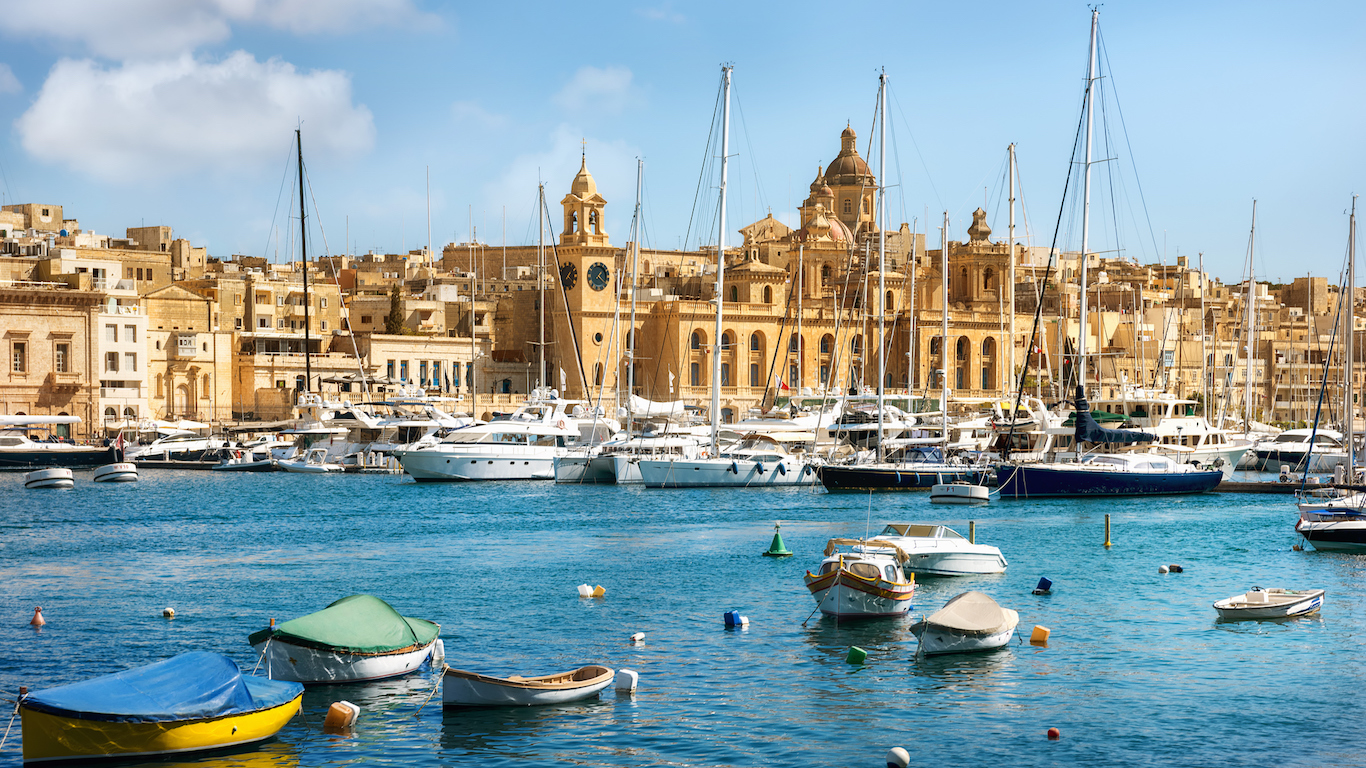
22. Malta
> Happiness score: 6.6
> GDP per capita: $35,469
> Pop. satisfied with their personal freedom: 91.7%
> Pop. with close friends or family: 92.9%
> Healthy life expectancy at birth: 71.8 years
Having a sense of control over one’s future and the freedom to make life choices can have considerable bearing on overall happiness. In the Mediterranean island nation of Malta, nearly 92% of residents are satisfied with their freedom to make life choices, a larger share than in all but 13 other countries worldwide.
Multiple studies suggest that generous individuals are generally happier. The high level of subjective well-being in Malta may be attributable in part to the population’s generosity, as people in Malta are more likely to make charitable donations than those in any other country on this list.
[in-text-ad-2]
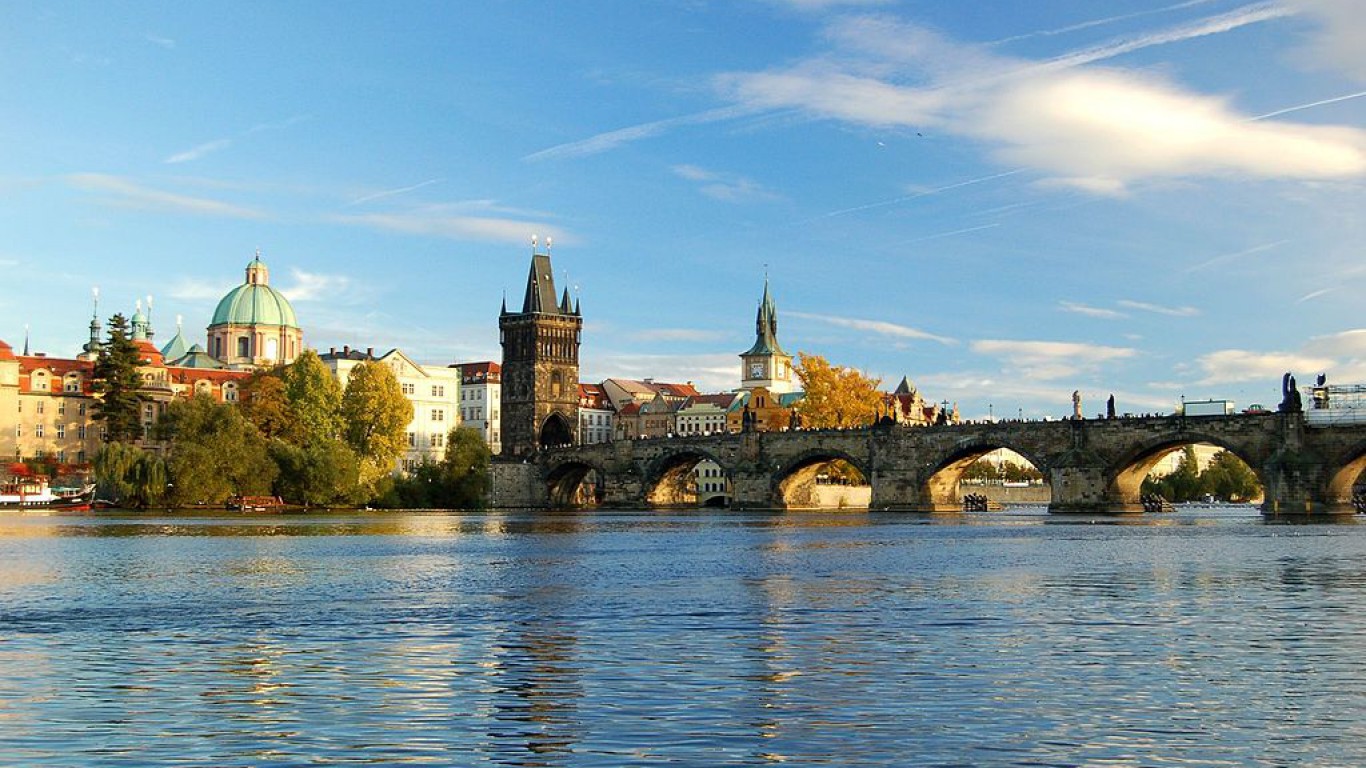
21. Czech Republic
> Happiness score: 6.7
> GDP per capita: $31,522
> Pop. satisfied with their personal freedom: 83.1%
> Pop. with close friends or family: 91.4%
> Healthy life expectancy at birth: 70.9 years
Formed in 1993 when the former nation of Czechoslovakia split, the Czech Republic is one of the youngest countries in the world. It is also one of the happiest. Happy countries are often affluent, and the Czech Republic’s GDP per capita of $31,522 is the highest of any country in Central and Eastern Europe. The Czech Republic is also the only country in Central or Eastern Europe to rank among the happiest in the world.
Not all Czech residents report high levels of life satisfaction, however. Residents born in the Czech Republic are more likely to be happy than the foreign-born population, and the difference in reported happiness between those two groups is the largest of any country on this list. Both the Czech President Milos Zeman and Prime Minister Andrej Babis were recently elected on anti-immigration platforms.

20. United Arab Emirates
> Happiness score: 6.8
> GDP per capita: $66,760
> Pop. satisfied with their personal freedom: 93.8%
> Pop. with close friends or family: 83.5%
> Healthy life expectancy at birth: 68.4 years
Along with Israel, the United Arab Emirates is the only country in the Middle East or North Africa to rank among the happiest in the world. One of the world’s largest oil exporters, the UAE is also one of the world’s wealthiest countries. The UAE’s GDP per capita of $66,760 is about $13,284 greater than that of the United States.
In addition to financial prosperity, the freedom to pursue a life of one’s choosing can have considerable bearing on personal happiness. Though the country is politically authoritarian, it is one of the most culturally liberal countries in the region, and nearly 94% of the population report being satisfied with their freedom to make life choices.
[in-text-ad]

19. United Kingdom
> Happiness score: 6.8
> GDP per capita: $39,196
> Pop. satisfied with their personal freedom: 82.2%
> Pop. with close friends or family: 94.3%
> Healthy life expectancy at birth: 71.8 years
Personal happiness can often be conditional on healthy interpersonal relationships. In the United Kingdom, one the happiest countries in the world, more than 94% of residents have a close friend or family member that they can count on any time, nearly the largest share of any country.
Happiness is closely linked to good health, and the U.K. is one of the healthiest countries in the world. From birth, U.K. residents can expect an average of 71.8 healthy years of life, about two years longer than the comparable estimate in the United States.

18. United States
> Happiness score: 6.9
> GDP per capita: $53,476
> Pop. satisfied with their personal freedom: 83.5%
> Pop. with close friends or family: 90.6%
> Healthy life expectancy at birth: 69.8 years
The United States ranks as the 18th happiest country in the world, behind 12 countries in Western Europe, as well as Australia, Canada, Costa Rica, Israel, and New Zealand. Contributing to overall happiness is the country’s GDP per capita of $53,476 — higher than in all but eight other countries. Generosity can also contribute considerably to personal happiness, and Americans are more likely to donate to charitable causes than residents of all but 13 other countries.
Americans’ happiness would likely improve with greater trust in institutions. Seven in in every 10 Americans perceive widespread corruption in government and business, a larger share than in most countries on this list. Additionally, immigrants living in the United States tend to report lower life satisfaction than residents born in the country.

17. Luxembourg
> Happiness score: 6.9
> GDP per capita: $94,730
> Pop. satisfied with their personal freedom: 90.6%
> Pop. with close friends or family: 92.7%
> Healthy life expectancy at birth: 72.2 years
Residents of wealthier countries are more likely to report high levels of personal well-being. Luxembourg, with the second highest-in-the-world GDP per capita of $94,730, is no exception. The small, landlocked nation ranks as the 17th happiest country in the world and the 12th happiest in Western Europe. People in Luxembourg are also relatively healthy. At birth, a person in Luxembourg can expect to live an average of 72.2 years in good health, about 2.4 years longer than in the United States.
Low incidence of corruption in business and government also likely plays a role in life satisfaction in Luxembourg. Just 35.4% of residents perceive widespread corruption in the country’s institutions, one of the lowest shares in the world.
[in-text-ad-2]
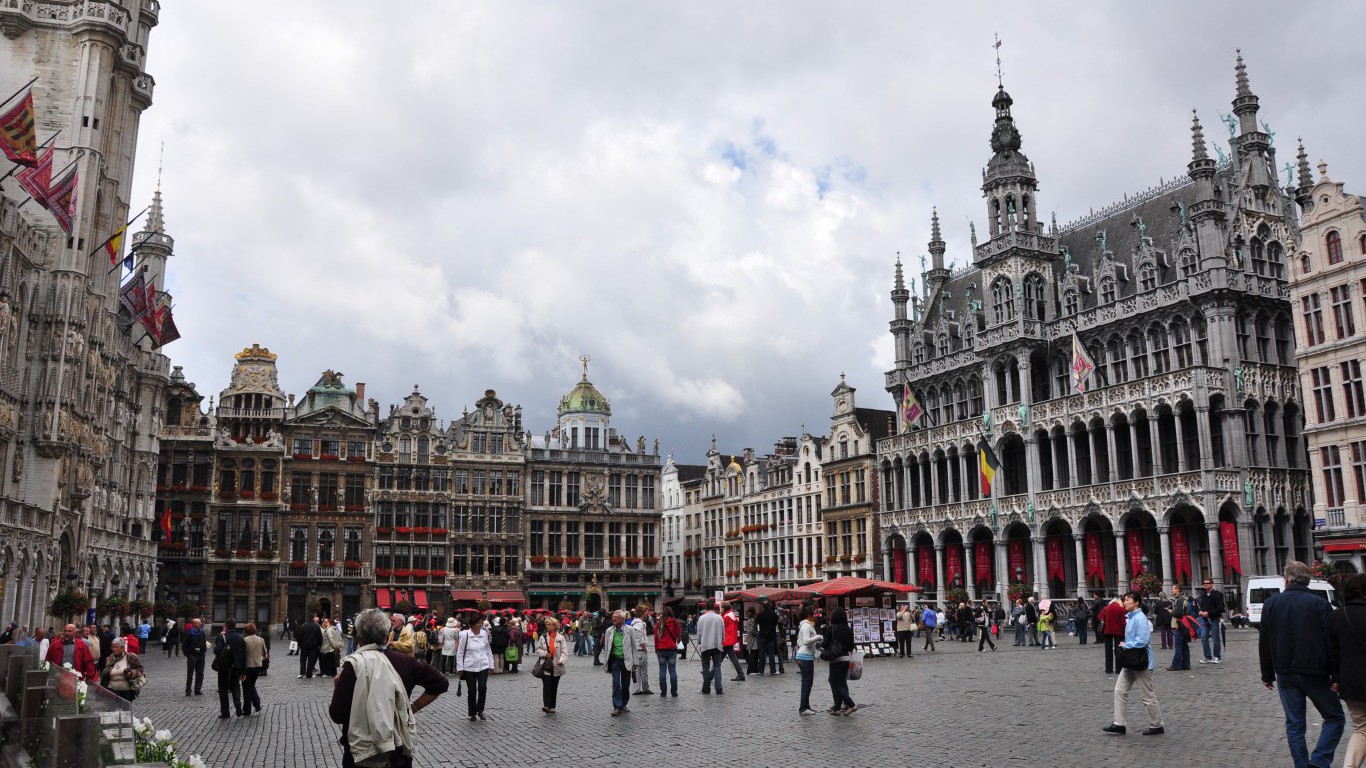
16. Belgium
> Happiness score: 6.9
> GDP per capita: $42,094
> Pop. satisfied with their personal freedom: 86.4%
> Pop. with close friends or family: 91.2%
> Healthy life expectancy at birth: 72.1 years
Health and happiness often go hand in hand, and Belgium is one of the healthiest countries in the world. Healthy life expectancy at birth in the Western European nation is 72.1 years, higher than in all but 13 other countries and nearly two and half years longer than in the United States.
Immigrants living in Belgium are far less likely to report high levels of well being than residents born in the country. The lower reported happiness among migrant communities may be partly attributable to growing anti-immigrant sentiment. Starting in 2016, non-EU migrants to the country were forced to sign a pledge acknowledging their acceptance of European values. Earlier this year, the Belgian government’s attempt to arrest migrants and refugees living in Brussels was met with massive protests.

15. Germany
> Happiness score: 7.0
> GDP per capita: $44,327
> Pop. satisfied with their personal freedom: 86.7%
> Pop. with close friends or family: 90.8%
> Healthy life expectancy at birth: 71.1 years
A sense of control over one’s future significantly contributes to overall happiness. In Germany, 86.7% of the population are satisfied with their personal freedom of choice — a larger share than in the vast majority of countries and a slightly higher share than the 83.5% of Americans.
As is the case in many Western European countries on this list, there is a high disparity in self reported happiness between residents born in Germany and those who immigrated to the country. The lower levels of happiness reported among migrants may be due in part to anti-immigrant backlash stoked by Chancellor Angela Merkel’s controversial decision to allow 1 million refugees into the country in 2015.
[in-text-ad]

14. Ireland
> Happiness score: 7.0
> GDP per capita: $62,699
> Pop. satisfied with their personal freedom: 89.1%
> Pop. with close friends or family: 95.2%
> Healthy life expectancy at birth: 71.6 years
Life satisfaction is higher in Ireland than in all but 13 other countries. Personal happiness can often depend on close personal relationships, and social connections are strong in Ireland. Some 95.2% of residents have a close friend or family member they can count on anytime, nearly the largest share of any country. Trust in institutions is relatively common in Ireland as only 38.2% of residents perceive widespread corruption in government and business, a smaller share than the majority of countries on this list.
Though Ireland’s GDP per capita of $62,699 is higher than all but six other countries worldwide, the figure is slightly misleading. Ireland’s per capita GDP spiked in recent years as major companies have moved assets to the country, largely from the United States. The practice, known as a corporate inversion, is typically employed to avoid higher corporate tax rates in the United States.

13. Costa Rica
> Happiness score: 7.1
> GDP per capita: $15,383
> Pop. satisfied with their personal freedom: 90.5%
> Pop. with close friends or family: 90.2%
> Healthy life expectancy at birth: 69.7 years
Life satisfaction is higher in Costa Rica than in any other country in Latin America or the Caribbean. Though Costa Rica is the poorest country on this list, with a GDP per capita of just $15,383, residents of the small tropical nation generally have healthy social connections and a strong sense of control over their futures. About nine in every 10 Costa Ricans have a close friend or family member they can rely on any time, and a similar share are satisfied with their freedom to choose what they want to do with their life.
Unlike Chile and Mexico, the other two Latin American countries on this list, Costa Ricans born in the country are more likely to report high levels of life satisfaction that those who immigrated to the country.
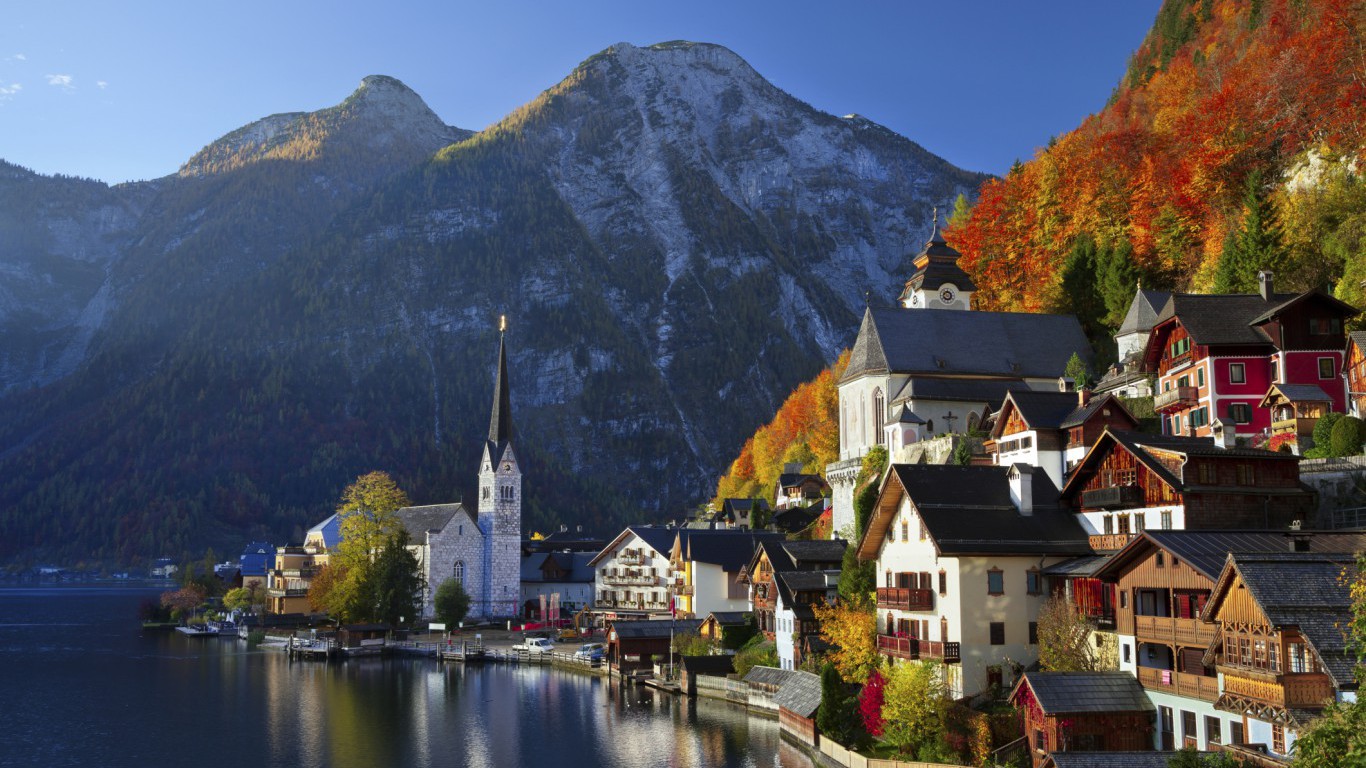
12. Austria
> Happiness score: 7.1
> GDP per capita: $44,574
> Pop. satisfied with their personal freedom: 89.3%
> Pop. with close friends or family: 92.0%
> Healthy life expectancy at birth: 72.0 years
Austria is a landlocked country in Western Europe that shares a border with three other countries on this list. Much like those neighbors, Austria is a relatively wealthy country with a socially connected, healthy population.
Austria’s GDP per capita of $44,574 is the 15th highest in the world. Additionally, Austrians’ healthy life expectancy at birth of 72 years is over two years longer than in the United States. Close personal relationships can be critical to personal happiness, and 92% of Austrians have a friend or family member they can rely on any time, a larger share than in the vast majority of countries.
[in-text-ad-2]
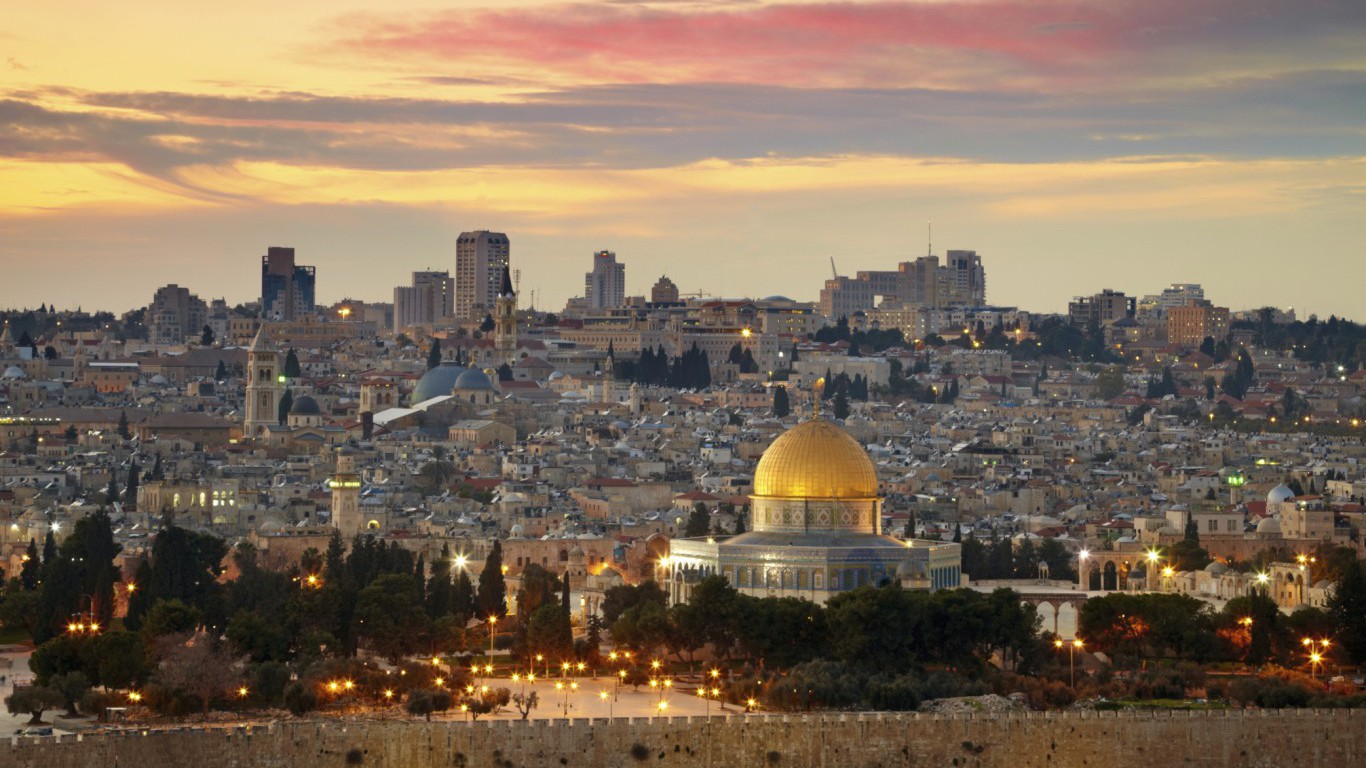
11. Israel
> Happiness score: 7.2
> GDP per capita: $32,588
> Pop. satisfied with their personal freedom: 76.5%
> Pop. with close friends or family: 89.1%
> Healthy life expectancy at birth: 72.0 years
Life satisfaction in the Middle East varies wildly. Nations in the region, such as Iraq and Yemen, rank among the least happy in the world. On the other hand, more affluent nations, such as Saudi Arabia and the United Arab Emirates are among the happier countries, and Israel ranks as the happiest in the area. One contributing factor to happiness in Israel is the population’s relative good health — the country’s an average healthy life expectancy of 72 years is about two years longer than the U.S. average.
Compared to most of the happiest countries in the world, Israel is an outlier in one key measure — a sense of freedom. Just 76.5% of the population report they are satisfied with their freedom to make life choices, which ranks 80th among the countries considered in the World Happiness Report. In all 10 of the happiest countries in the world, more than 90% of the population report satisfaction with their sense of freedom.
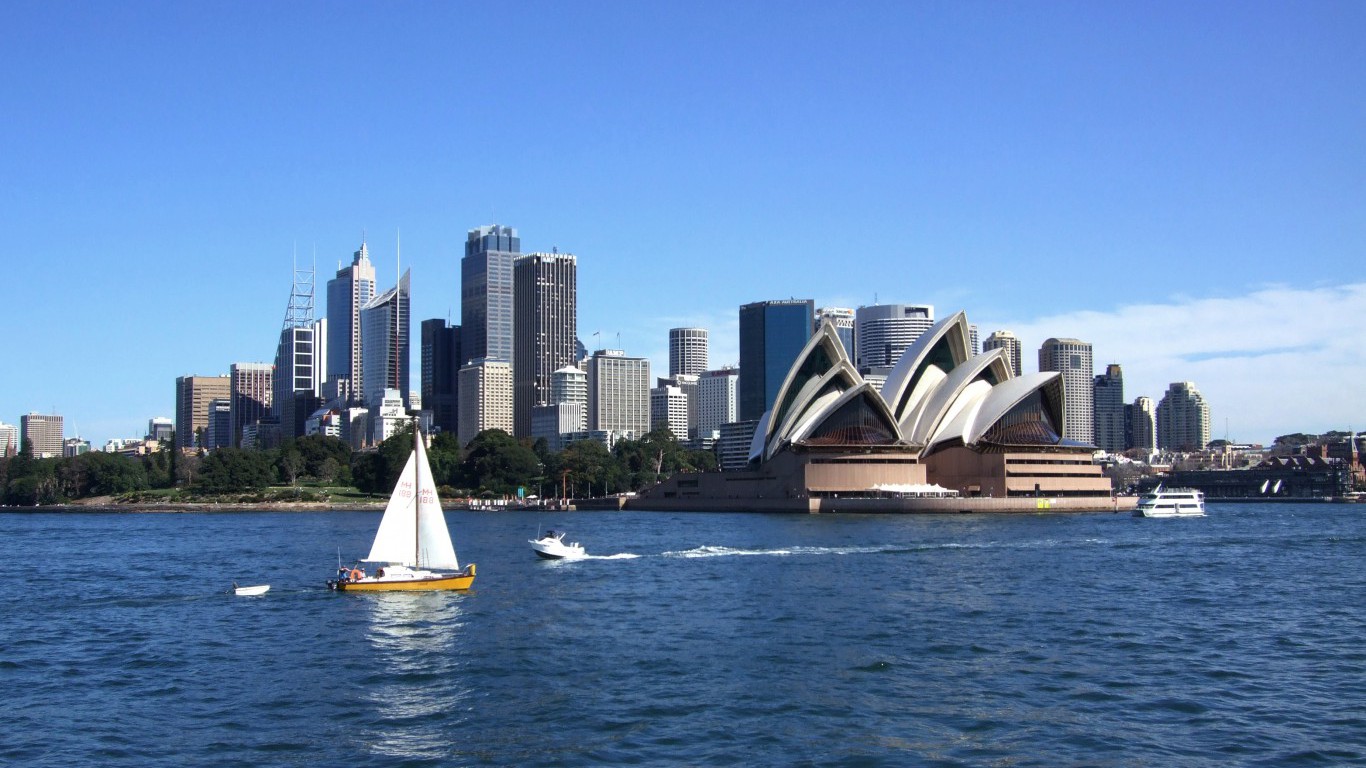
10. Australia
> Happiness score: 7.3
> GDP per capita: $44,374
> Pop. satisfied with their personal freedom: 91.8%
> Pop. with close friends or family: 94.8%
> Healthy life expectancy at birth: 72.7 years
Generous people are more likely to report greater well being, and Australians are more likely to make regular charitable donations than residents of any other country on this list, with the exception of Malta. Australians are also relatively unencumbered by corruption. Just 38.9% of the population perceives widespread corruption in business and government institutions in the country, one of the smallest such shares of any country.
Perhaps the most critical component of personal happiness is a strong social support network. In Australia, nearly 95% of the population report having a close friend or family member they can rely on, nearly the largest such share in the world.
[in-text-ad]
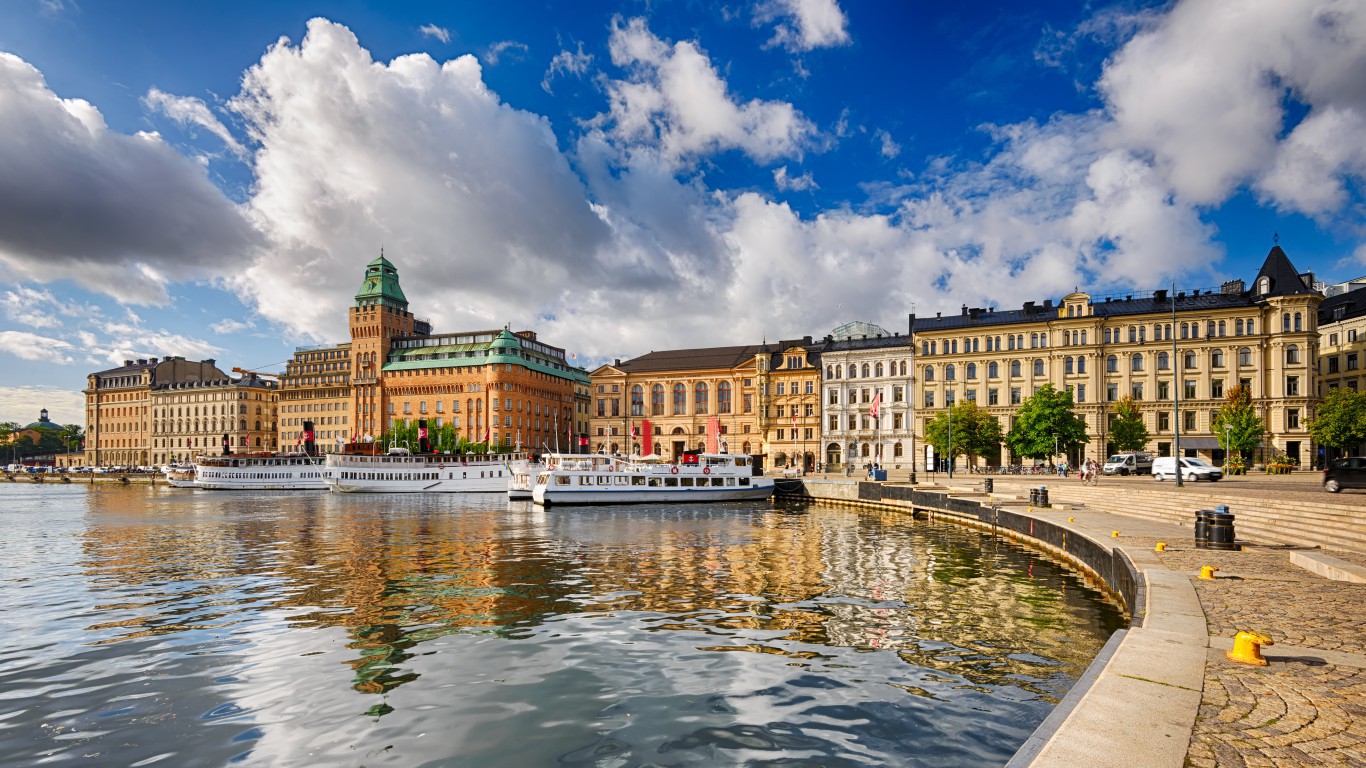
9. Sweden
> Happiness score: 7.3
> GDP per capita: $46,638
> Pop. satisfied with their personal freedom: 92.9%
> Pop. with close friends or family: 91.9%
> Healthy life expectancy at birth: 72.7 years
Sweden is home to one of the healthiest populations in the world. An individual living in the country from birth can expect to live an average of 72.7 of healthy years, the third longest healthy life expectancy of any country on this list. The Swedish also face relatively little oppression in the way of corruption. Fewer than 24% of the country’s population perceives rampant corruption in either the government or business, nearly the smallest share of any country in the world.
Though Sweden ranks as the ninth happiest country, its happiness score falls below that of every other Nordic country.

8. New Zealand
> Happiness score: 7.3
> GDP per capita: $35,221
> Pop. satisfied with their personal freedom: 93.7%
> Pop. with close friends or family: 96.0%
> Healthy life expectancy at birth: 71.6 years
New Zealand is the happiest country in Oceania and the eighth happiest in the world. The country’s high subjective well being score is due in large part to close social connections between residents. Nearly everyone in New Zealand — 96% of the population — has a close friend or family member they can count on any time, the second largest share of any country.
New Zealanders’ sense of life satisfaction is relatively unfettered by institutional corruption. Just 22.9% of the population perceives widespread corruption in government and business, nearly the smallest share of any country.

7. Canada
> Happiness score: 7.3
> GDP per capita: $43,036
> Pop. satisfied with their personal freedom: 92.4%
> Pop. with close friends or family: 93.2%
> Healthy life expectancy at birth: 72.2 years
While anti-immigration sentiments seem to be growing in many parts of Europe and the United States, Canada has taken in close to 100,000 refugees in the past two years, and an estimated 20,000 people have illegally crossed the border from the United States into Canada seeking asylum in the last year. Even though locally born Canadians are happier on average than foreign born residents, Canada’s immigrant population is one of the happiest in the world.
A strong sense of social connectedness likely contributes to overall happiness in the country. Some 93.2% of Canadians have a close friend or family member they can count on any time, a slightly larger share than the 90.6% of Americans.
[in-text-ad-2]

6. Netherlands
> Happiness score: 7.4
> GDP per capita: $47,464
> Pop. satisfied with their personal freedom: 91.1%
> Pop. with close friends or family: 91.4%
> Healthy life expectancy at birth: 71.6 years
Those who spend time and money helping others are more likely to be happy — and Dutch people are among the most generous in the world. The Dutch are more likely to make regular charitable contributions than residents of all but seven other countries worldwide. They also have a high level of trust in their countries institutions. Just 40.3% of Netherlands residents perceive widespread corruption in government and or business, one of the smallest shares globally.
Like several other Western European countries on this list, the difference in happiness scores between foreign born Netherlands residents and those born in the country is relatively large. The relatively unhappy immigrant population may be the result of growing anti-immigrant and specifically anti-Muslim sentiment in the country.

5. Switzerland
> Happiness score: 7.5
> GDP per capita: $57,333
> Pop. satisfied with their personal freedom: 92.9%
> Pop. with close friends or family: 93.9%
> Healthy life expectancy at birth: 73.2 years
Switzerland’s population is one of the happiest in the world. While non-native Swiss residents also rank relatively high in well-being, the native-born population reports extremely high average well-being.
Overall affluence correlates highly with well-being among countries, and Switzerland has one of the wealthiest populations. The country’s GDP per capita of $57,333 is the eighth highest of the countries considered in the World Happiness Report. The country also appears to be one of the least corrupt, which could contribute to the overall sense of life satisfaction among the population. Just 28.8% of the population reports a sense of corruption in the government or business climate. In contrast, 70% of Americans report perceptions of corruption.
[in-text-ad]

4. Iceland
> Happiness score: 7.5
> GDP per capita: $44,854
> Pop. satisfied with their personal freedom: 94.3%
> Pop. with close friends or family: 97.7%
> Healthy life expectancy at birth: 72.8 years
Icelanders rate their personal well-being at an average of 7.5 out of 10, the fourth highest happiness score in the world. Strong personal relationships are one of the most important factors in individual well-being, and Icelanders have strong social support networks. Some 97.7% of the population have a friend or family member they can rely on in the case of an emergency, the largest share of any country in the world. Additionally, nearly all Icelanders — 94.3% of the population — are satisfied with their freedom to make life choices.
Unlike most countries on this list, there is virtually no difference in subjective well-being scores between the immigrant population in Iceland and those born there.
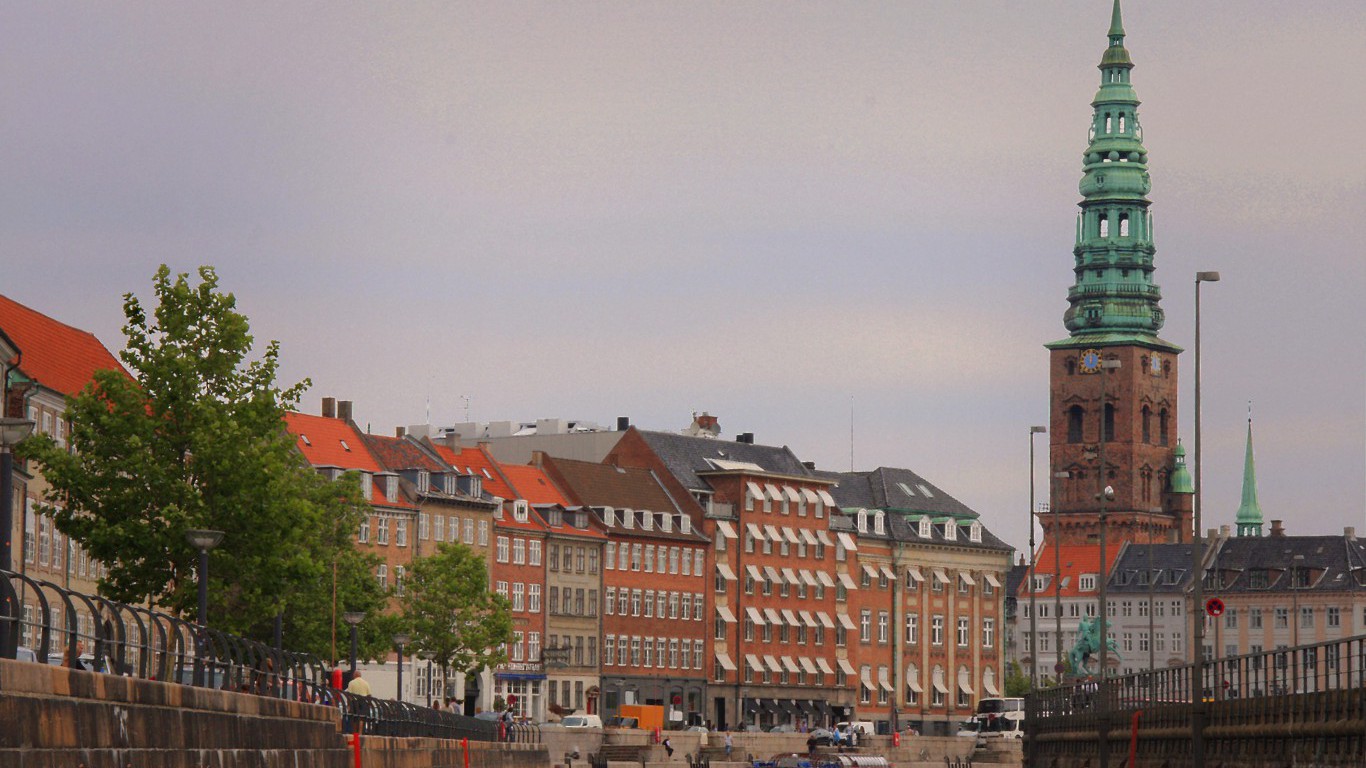
3. Denmark
> Happiness score: 7.6
> GDP per capita: $46,000
> Pop. satisfied with their personal freedom: 94.9%
> Pop. with close friends or family: 95.5%
> Healthy life expectancy at birth: 71.3 years
Likely due in large part to close social connections, a prevailing sense of personal freedom, and trust in institutions, the Danes rank as the world’s third happiest population, only narrowly trailing Norway and Finland. About 95% of Danes are satisfied with their personal freedom to make life choices, and 96% have a close friend or family member they can count on any time — each the fourth largest share of any country. Additionally, fewer than 20% of Danes perceive widespread corruption in government or business institutions, nearly the smallest share in the world and the smallest share in Western Europe.

2. Norway
> Happiness score: 7.6
> GDP per capita: $64,340
> Pop. satisfied with their personal freedom: 95.2%
> Pop. with close friends or family: 95.2%
> Healthy life expectancy at birth: 71.1 years
Happiness can be contingent on one’s perception of his or her own freedom, and residents of Norway are among the most likely people in the world to have a strong sense of control over their own future. Some 95.2% of the population are satisfied with their personal freedom to make life choices, the largest share of any country on this list.
Most of the happiest countries are also affluent, and Norway is no exception. GDP per capita in the Scandinavian country is $64,340, the sixth highest in the world and the second highest in Western Europe, trailing only Luxembourg.
[in-text-ad-2]

1. Finland
> Happiness score: 7.6
> GDP per capita: $39,675
> Pop. satisfied with their personal freedom: 94.7%
> Pop. with close friends or family: 95.6%
> Healthy life expectancy at birth: 71.5 years
Finland’s population is the happiest in the world. Though with a GDP per capita of $39,675 the country is not the wealthiest, the country ranks high by a number of other factors that have been shown to bolster personal happiness. For example, the Finnish are relatively trusting, with just 22.1% of residents perceiving widespread corruption in government and business institutions, nearly the smallest share in the world. Additionally, nearly all country residents have a close friend or family member they can count on any time, and there is almost universal satisfaction with their personal freedom to make life choices.
Finland is one of only four countries on this list in which the foreign born population has a higher happiness score than those born in the country.
Detailed Findings & Methodology
While money does not buy happiness, a certain amount of it is necessary to achieve a basic lifestyle threshold that can serve as the foundation for well-being. Partially as a result, the happiest countries tend to be relatively high income. In Costa Rica, the poorest country on this list, GDP per capita is $15,383, still more than in the majority of countries worldwide. In all but five countries on this list GDP per capita is over $35,000.
One of the most important components of happiness is a close social circle and strong personal relationships. Not surprisingly, people living in the happiest countries tend to have strong support networks. In every country on this list, at least 81% of the population have a close friend or family member they can count on any time. In all but four of the happiest countries, the share of the population with such strong social support is over 90%.
Personal freedom to make life choices can also have a profound impact on individual happiness, and the world’s happiest countries are generally home to populations with a strong sense of personal freedom. In Chile, 73.7% of the population are satisfied with their freedom to do whatever they choose with their life, the smallest share on this list. In the majority of countries on this list, over 90% of the population are satisfied with their freedom of choice.
Three other measures that have been found to support personal well-being were included in the World Happiness report. The first is healthy life expectancy, measured as the number of years an individual born in a given country can expect to live a healthy life. The second is generosity, a measure of the frequency and likelihood residents of a given country make charitable donations. The third measure is trust, represented as the share of individuals who perceive widespread corruption in government and or business institutions within their home country.
With few exceptions, the happiest countries score well on these metrics across the board.
One focus of the World Happiness Report 2018 is the happiness of immigrant populations in different countries. Notably, if ranked solely by the well-being of the foreign born population, the list of the happiest countries would change little. This is likely because a high quality of life in a given country benefits everyone living there.
Still, immigrants are generally less happy in the countries on this list than those who were born there. Possible explanations for the phenomenon vary from the natural tumult that can accompany a life changing international move to recent anti-immigrant sentiment and legislation in the United States and some Western European countries.
To identify the happiest countries in the world, 24/7 Wall St. reviewed The World Happiness Report 2018. The report is produced by the UN-initiative Sustainable Development Solutions Network. Researchers used a range of survey data from the 2015-2017 Gallup World Poll to rank happiness levels in 156 countries. GDP per capita and healthy life expectancy data for each country were obtained from the International Monetary Fund and the World Bank.
Credit card companies are at war, handing out free rewards and benefits to win the best customers. A good cash back card can be worth thousands of dollars a year in free money, not to mention other perks like travel, insurance, and access to fancy lounges. See our top picks for the best credit cards today. You won’t want to miss some of these offers.
Flywheel Publishing has partnered with CardRatings for our coverage of credit card products. Flywheel Publishing and CardRatings may receive a commission from card issuers.
Thank you for reading! Have some feedback for us?
Contact the 24/7 Wall St. editorial team.